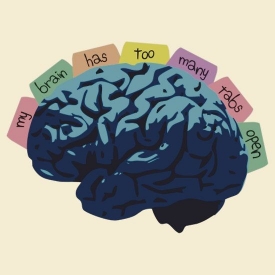Some say we’ve created more information in the last 10 years than in all of human history. When it comes to doing research online, this can be both daunting and exciting at the same time. We have more access to information than ever before, but we can easily overburden our brains. One search leads to hundreds, thousands of possibilities for click-age. Click one brings a new discovery, to another, and down the rabbit hole you go. Soon enough you have more tabs open than can fit in your browser, and are more confused and overwhelmed than when you typed in that first search. Information overloaded, yet again. Are our brains even configured for the internet’s vast informational possibilities?
According to Daniel Levitin, McGill University psychology professor and author of “The Organized Mind: Thinking Straight in the Age of Information Overload,” the conscious mind can pay attention to three, maybe four, things at once. If you get much beyond that, you begin to exercise poorer judgment, you lose track of things and you lose your focus. Information overload occurs when a person is exposed to more information than the brain can process at one time. Forbes wrote a post based on Levitin’s findings in his book: 10 Steps To Conquering Information Overload. Each step provides a different strategy to make fast decisions for a healthy and focused brain, limit distractions, and move effectively between modes of consciousness and thinking.
Psych Central’s article Overcoming Information Overload provides some interesting history on the phenomenon, and summarizes some key points from Lucy Jo Palladino’s work, Ph.D, a psychologist and author of Find Your Focus Zone: An Effective New Plan to Defeat Distraction and Overload. Death By Information Overload from the Harvard Business Review is not only a great read, but identifies the problems of information overload for both individuals and organizations. The article then matches specific solutions - either technological tools or cultural/mindset changes - to each problem.
A researcher’s survival guide to information overload and curation tools is useful to read for those researching in academic contexts. LSE’s Mark Carrigan writes that curation tools are the only thing that can save a busy researcher’s sanity. There’s a wide range of different tools which can be used to manage, sort and catalogue material; Storify and Scoop.It to name a few.


